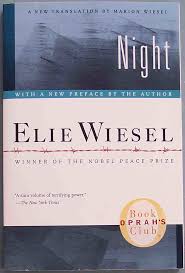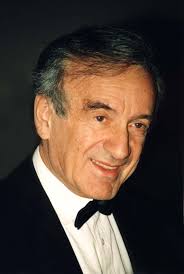Night Page #3
"Night" is a work by Elie Wiesel about his experience with his father in the Nazi German concentration camps at Auschwitz and Buchenwald in 1944–1945, at the height of the Holocaust toward the end of the Second World War. In just over 100 pages of sparse and fragmented narrative, Wiesel writes about the death of God and his own increasing disgust with humanity, reflected in the inversion of the parent–child relationship, as his father declines to a helpless state and Wiesel becomes his resentful teenage caregiver. "If only I could get rid of this dead weight ... Immediately I felt ashamed of myself, ashamed forever." In Night everything is inverted, every value destroyed. "Here there are no fathers, no brothers, no friends", a kapo tells him. "Everyone lives and dies for himself alone." Wiesel was 16 when Buchenwald was liberated by the United States Army in April 1945, too late for his father, who died after a beating while Wiesel lay silently
"I'm going right now," he said. "I'll return as soon as possible. I'll tell you everything. Wait for me." We were ready to wait as long as necessary. The courtyard turned into something like an antechamber to an operating room. We stood, waiting for the door to open. Neighbors, hearing the rumors, had joined us. We stared at our watches. Time had slowed down. What was the meaning of such a long session? "I have a bad feeling," said my mother. "This afternoon I saw new faces in the ghetto. Two German officers, I believe they were Gestapo. Since we've been here, we have not seen a single officer..." It was close to midnight. Nobody felt like going to sleep, though some people briefly went to check on their homes. Others left but asked to be called as soon as my father returned. At last, the door opened and he appeared. His face was drained of color. He was quickly surrounded. "Tell us. Tell us what's happening! Say something..." At that moment, we were so anxious to hear something encouraging, a few words telling us that there was nothing to worry about, that the meeting had been routine, just a review of welfare and health problems...But one glance at my father's face left no doubt. "The news is terrible," he said at last. And then one word: "Transports." The ghetto was to be liquidated entirely. Departures were to take place street by street, starting the next day. We wanted to know everything, every detail. We were stunned, yet we wanted to fully absorb the bitter news. "Where will they take us?" That was a secret. A secret for all, except one: the president of the Jewish Council. But he would not tell, or could not tell. The Gestapo had threatened to shoot him if he talked. "There are rumors," my father said, his voice breaking, "that we are being taken somewhere in Hungary to work in the brick factories. It seems that here, we are too close to the front..." After a moment's silence, he added: "Each of us will be allowed to bring his personal belongings. A backpack, some food, a few items of clothing. Nothing else."Again, heavy silence. "Go and wake the neighbors," said my father. "They must get ready..." The shadows around me roused themselves as if from a deep sleep and left silently in every direction. FOR A MOMENT, we remained alone. Suddenly Batia Reich, a relative who lived with us, entered the room: "Someone is knocking at the sealed window, the one that faces outside!" It was only after the war that I found out who had knocked that night. It was an inspector of the Hungarian police, a friend of my father's. Before we entered the ghetto, he had told us, "Don't worry. I'll warn you if there is danger." Had he been able to speak to us that night, we might still have been able to flee...But by the time we succeeded in opening the window, it was too late. There was nobody outside. THE GHETTO was awake. One after the other, the lights were going on behind the windows. I went into the house of one of my father's friends. I woke the head of the household, a man with a gray beard and the gaze of a dreamer. His back was hunched over from untold nights spent studying. "Get up, sir, get up! You must ready yourself for the journey. Tomorrow you will be expelled, you and your family, you and all the other Jews. Where to? Please don't ask me, sir, don't ask questions. God alone could answer you. For heaven's sake, get u p ... " He had no idea what I was talking about. He probably thought I had lost my mind. "What are you saying? Get ready for the journey? What journey? Why? What is happening? Have you gone mad?" Half asleep, he was staring at me, his eyes filled with terror, as though he expected me to burst out laughing and tell him to go back to bed. To sleep. To dream. That nothing had happened. It was all in jest... My throat was dry and the words were choking me, paralyzing my lips. There was nothing else to say. At last he understood. He got out of bed and began to dress, automatically. Then he went over to the bed where his wife lay sleeping and with infinite tenderness touched her forehead. She opened her eyes and it seemed to me that a smile crossed her lips. Then he went to wake his two children. They woke with a start, torn from their dreams. I fled. Time went by quickly. It was already four o'clock in the morning. My father was running right and left, exhausted, consoling friends, checking with the Jewish Council just in case the order had been rescinded. To the last moment, people clung to hope. The women were boiling eggs, roasting meat, preparing cakes, sewing backpacks. The children were wandering about aimlessly, not knowing what to do with themselves to stay out of the way of the grown-ups. Our backyard looked like a marketplace. Valuable objects, precious rugs, silver candlesticks, Bibles and other ritual objects were strewn over the dusty grounds—pitiful relics that seemed never to have had a home. All this under a magnificent blue sky.
Translation
Translate and read this book in other languages:
Select another language:
- - Select -
- 简体中文 (Chinese - Simplified)
- 繁體中文 (Chinese - Traditional)
- Español (Spanish)
- Esperanto (Esperanto)
- 日本語 (Japanese)
- Português (Portuguese)
- Deutsch (German)
- العربية (Arabic)
- Français (French)
- Русский (Russian)
- ಕನ್ನಡ (Kannada)
- 한국어 (Korean)
- עברית (Hebrew)
- Gaeilge (Irish)
- Українська (Ukrainian)
- اردو (Urdu)
- Magyar (Hungarian)
- मानक हिन्दी (Hindi)
- Indonesia (Indonesian)
- Italiano (Italian)
- தமிழ் (Tamil)
- Türkçe (Turkish)
- తెలుగు (Telugu)
- ภาษาไทย (Thai)
- Tiếng Việt (Vietnamese)
- Čeština (Czech)
- Polski (Polish)
- Bahasa Indonesia (Indonesian)
- Românește (Romanian)
- Nederlands (Dutch)
- Ελληνικά (Greek)
- Latinum (Latin)
- Svenska (Swedish)
- Dansk (Danish)
- Suomi (Finnish)
- فارسی (Persian)
- ייִדיש (Yiddish)
- հայերեն (Armenian)
- Norsk (Norwegian)
- English (English)
Citation
Use the citation below to add this book to your bibliography:
Style:MLAChicagoAPA
"Night Books." Literature.com. STANDS4 LLC, 2025. Web. 30 Jan. 2025. <https://www.literature.com/book/night_336>.








Discuss this Night book with the community:
Report Comment
We're doing our best to make sure our content is useful, accurate and safe.
If by any chance you spot an inappropriate comment while navigating through our website please use this form to let us know, and we'll take care of it shortly.
Attachment
You need to be logged in to favorite.
Log In